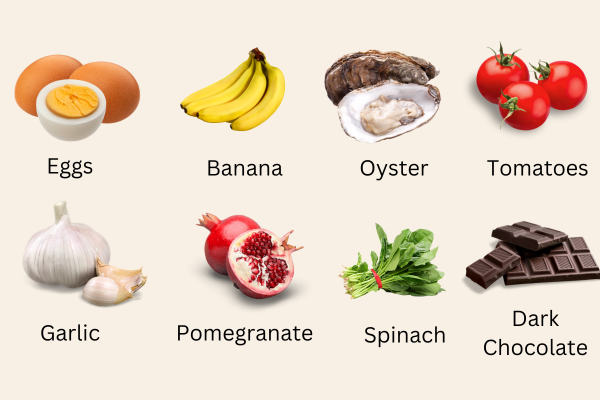10 foods That Increase Sperm Count
Introduction
The number of sperm plays a vital role in determining male reproductive capacity. It refers to the number of sperm cells present in a given sample of semen. A healthy sperm count is essential for successful conception, as it increases the chances of fertilizing an egg. Various factors can affect sperm count, including age, lifestyle choices, and diet. Understanding the importance of maintaining a healthy sperm count is vital for couples trying to conceive.
The Role of Diet in Sperm Production
Diet plays a significant role in sperm production and overall sperm health. The nutrients we consume directly impact the quality and quantity of sperm cells. A well-balanced diet that includes essential vitamins, minerals, and antioxidants can enhance sperm count and motility. On the other hand, a poor diet lacking in these nutrients can lead to decreased sperm production and fertility issues.
Top 10 Foods That Increase Sperm Count
Maintaining a healthy sperm count is crucial for male reproductive health and fertility. Here are the top 10 foods that increase your sperm count:
Dark chocolate: A delicious way to boost sperm count
Dark chocolate is not only a delicious treat but also a food that can improve sperm count and motility. It contains flavonoids and antioxidants that have been shown to enhance sperm health. These compounds in dark chocolate can help combat oxidative stress that may be detrimental to sperm health.
Flavonoids help increase blood flow to the reproductive organs, promoting better sperm production. Antioxidants, on the other hand, protect sperm cells from oxidative stress, which can damage their DNA and reduce their quality. Including dark chocolate in your diet in moderation may support overall reproductive health
Spinach: A nutrient-dense vegetable for healthy sperm
Spinach is a nutrient-dense vegetable that provides numerous vitamins and minerals essential for healthy sperm production. It is rich in folate, which plays a crucial role in DNA synthesis and cell division, both vital for sperm development. Additionally, spinach contains magnesium, which helps regulate testosterone levels and supports overall reproductive health.
Antioxidants in spinach protect sperm cells from damage, enhancing reproductive health. A balanced diet rich in fertility-boosting foods like spinach is crucial for healthy sperm development and conception. Incorporating spinach into meals positively impacts fertility and reproductive outcomes.
Walnuts: A rich source of omega-3 fatty acids for improved sperm quality
Walnuts are an excellent source of omega-3 fatty acids, which are essential for healthy sperm development. These fatty acids help improve sperm quality by enhancing membrane fluidity and promoting better motility. Walnuts also provide other nutrients like protein and vitamin E, which further support reproductive health.
Including walnuts in your diet can be beneficial for improving sperm quality and motility due to the high content of these omega-3 fatty acids. These healthy fats play a crucial role in enhancing the overall health of sperm cells, making them stronger and more viable for fertilization
Pomegranates: A fruit with potent antioxidant properties for enhanced sperm motility
Pomegranates are known for their potent antioxidant properties, making them beneficial for sperm health, count, and quality. Antioxidants help protect sperm cells from oxidative stress, reducing the risk of DNA damage and improving motility.
Pomegranates also contain other nutrients like vitamin C and potassium, which contribute to overall reproductive health. Regular consumption supports fertility.
Garlic: A natural aphrodisiac that can improve sperm count and quality
Garlic is not only a natural aphrodisiac but also a food that can improve sperm count and quality. It contains beneficial compounds like allicin, which has been shown to enhance sperm production. Garlic also possesses antibacterial properties, which can help prevent infections that may negatively impact sperm health.
Overall, incorporating nutrient-rich foods like garlic into your daily diet may help improve fertility factors in men. Consulting with a healthcare provider or a nutritionist can provide personalized recommendations based on individual health needs and goals.

Eggs: A protein-rich food that can boost testosterone levels and sperm production
Eggs are considered a powerhouse food when it comes to supporting sperm health. Eggs are a protein-rich food that can boost testosterone levels and support healthy sperm production. Testosterone is crucial for sperm development, and consuming adequate protein helps maintain optimal testosterone levels.
Incorporating eggs into your diet can help increase sperm count and overall fertility potential. The high-quality proteins found in eggs provide the necessary building blocks for sperm development and maturation. Eggs also provide other essential nutrients like vitamins D and B12 as well as choline, all of which play a role in enhancing male reproductive health.
Incorporating eggs into your diet can help increase sperm count and overall fertility potential. Consuming eggs regularly can positively impact sperm quality and quantity. When aiming to improve sperm count, including eggs in a balanced diet along with other fertility-boosting foods can be advantageous.
Oysters: A seafood delicacy that is high in zinc, a mineral essential for healthy sperm
Oysters are well-known for their reputation as an aphrodisiac, but they also provide a significant amount of zinc, a mineral essential for healthy sperm development. Zinc is a mineral that plays a vital role in supporting fertility in men by boosting sperm count and quality.
It also helps protect sperm cells from oxidative damage and supports overall reproductive health. Consuming a balanced diet with sufficient zinc intake can positively impact reproductive health. Zinc aids in the production of testosterone, which is crucial for sperm production.
Men looking to boost their sperm count may benefit from incorporating zinc-rich foods into their daily meals. Oysters are also rich in other nutrients like vitamin B12 and iron, which further contribute to optimal sperm health.
Incorporating oysters and other zinc-rich foods into the diet can potentially improve fertility outcomes for men struggling with low sperm counts.
Bananas: A fruit that is rich in vitamins and minerals for improved sperm health
Bananas are a nutritious fruit packed with essential vitamins and minerals that can benefit sperm health, including vitamin C and potassium. They are rich in vitamin C, an antioxidant that helps protect sperm cells from oxidative stress.
Potassium plays a vital role in regulating blood pressure and supporting muscle function, including the muscles involved in sperm production.
Broccoli: A cruciferous vegetable that can increase sperm count and motility
Broccoli is a cruciferous vegetable that offers numerous health benefits, including improved sperm count and motility. It contains vitamin K, which plays a role in sperm development and maturation. Broccoli is also rich in folate, a nutrient essential for DNA synthesis and cell division, both crucial for healthy sperm production.
In addition to vitamin K and folate, broccoli also contains other important vitamins and minerals that support overall reproductive health. By incorporating broccoli into your regular meals, you may potentially help increase your sperm count and motility naturally. This green veggie is not only nutritious but also offers various health benefits beyond just fertility enhancement.
Tomatoes: A fruit that is high in lycopene, a powerful antioxidant that can improve sperm quality
Tomatoes are a fruit rich in lycopene, a powerful antioxidant that can improve sperm quality. Lycopene helps protect sperm cells from oxidative damage, reducing the risk of DNA fragmentation and improving overall sperm health. Tomatoes also provide other nutrients like vitamin C and potassium, which further support reproductive health.
Incorporating tomatoes into your diet can provide a natural boost to your reproductive health. Apart from lycopene, tomatoes are also rich in other essential nutrients like vitamins C and A, as well as potassium and folate. These nutrients work synergistically to support overall reproductive function and hormone balance.
Including tomatoes in your daily meals can be as simple as adding them to salads, sandwiches, or pasta dishes. Opting for cooked or processed tomato products like tomato sauce or canned tomatoes also ensures a higher concentration of lycopene due to the cooking process which breaks down the cell walls and releases more of this beneficial compound.
Conclusion
In conclusion, maintaining a healthy diet plays a vital role in promoting optimal sperm health and fertility. The selection of foods that increase sperm count highlighted above, such as dark chocolate, spinach, walnuts, pomegranates, garlic, eggs, oysters, bananas, broccoli, and tomatoes, offer valuable nutrients that can enhance sperm count and quality.
By incorporating these nutrient-rich options into your daily meals, you can actively support your reproductive health and increase the likelihood of successful conception. Remember that a balanced and nutrient-rich diet not only benefits sperm health but also contributes to overall well-being.
Make informed choices about what you eat to prioritize your reproductive health and overall wellness.

